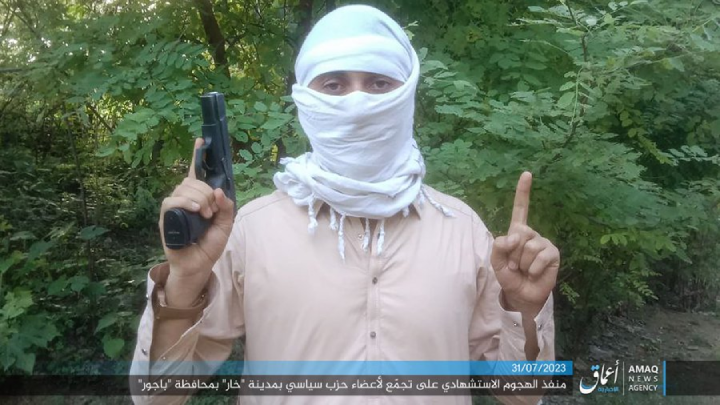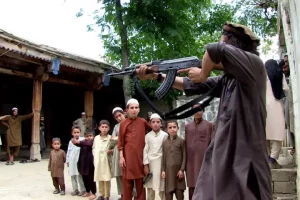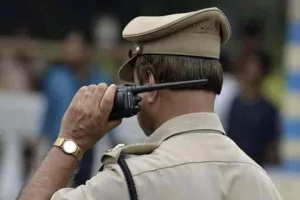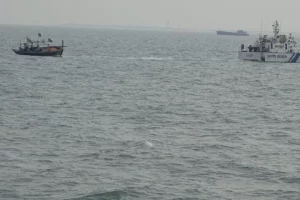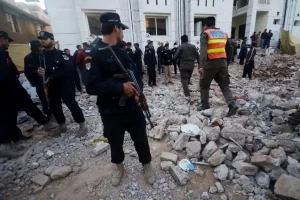Last Sunday’s powerful suicide bombing at convention of politico-religious party Jamiat Ulema-e-Islam (Fazl) in Bajaur has emitted dangerous signals for Deobandis that run almost every madrasa in the Pashtun area. And it was in Bajaur that most of Afghan Mujahideen and current Taliban cadres were groomed by Deobandis.
The Islamic State of Khorasan Province (ISKP) has claimed responsibility for the attack. The local chapters of the ISKP have been attacking JUI(F) but mostly resorting to targeted killing. Sunday’s attack is a signal that Deobandis are the first in their firing line.
TKD MONITORING:
Wifaq ul Madaris Al-Arabia, Pakistan’s largest federation of Sunni Deobandi Islamic seminaries, has announced to observe this Friday as a day of “condemnation” over Bajaur suicide attack. Prayer leaders are advised all across the country to hold special sermons… pic.twitter.com/OUmq1Nwq95— The Khorasan Diary (@khorasandiary) August 3, 2023
Of many charges, the foremost is that Deobandis are shunning support to the cause of Jihad and are tilting more towards electoral politics.
The biggest attack on any of JUI(F)’s events has taken place when the party is a key partner of ruling Pakistan Democratic Alliance and its leader Maulana Fazlur Rehman has been enjoying unprecedented popularity in the area and now plays a pivotal role in the national politics as the country is heading to next general election.
Prime Minister @CMShehbaz arrives in Peshawar alongside Army Chief Gen Syed Asim Munir and JUI-F Chief Maulana Fazlur Rehman to console those injured in Bajaur suicide bomb attack pic.twitter.com/2c6PV2anL9
— The Friday Times (@TFT_) August 2, 2023
The toll of the deadly blast has touched 70 and all 120 villages of Bajaur have either held at least one funeral or have one grievously injured person. Among those killed was JUI-F leader Ziaullah Jan. Among those killed, 23 are below 18 years of age.
Why are Deobandis being targeted?
Claiming the responsibility of Bajaur suicide bombing, the ISKP announced through its news agency Amaq News Agency that it has been targeting JUI(F) as it is supporting a democratic set-up in Pakistan and that the group deems democracy as against the Shariah.
The ISKP said that it has targeted JUI(F) because of its links with the Taliban regime in Afghanistan. Taliban, like JUI(F), is also led by Deobandi clergy and ideology, and it has been in severe battle with ISKP and similar splinter groups since their takeover of Kabul.
In the past, the ISKP has targeted several local leaders of the JUI-F in Bajaur, suspecting them of having close ties with the Taliban administration in neighbouring Afghanistan. In recent years, some of the more prominent leaders to have been targeted by the militant outfit include Mufti Sultan Muhammad, Maulana Abdul Salam, Qari Ilyas, Maulana Shafiullah, and Mufti Bashir.
The party chief, Maulana Fazlur Rehman, has himself survived several suicide attacks. In July, Rehman had revealed that around 18 prominent local leaders of his party have been killed in recent years.
The JUI-F’s local leadership has been echoing the views of the Afghan Taliban, irrespective of the party’s central policy of focusing more on Pakistan and its politics.
Taliban expert Muhammad Israr Madani, head of the International Research Council for Religious Affairs (IRCRA), an Islamabad-based research body that studies Islamic movements, commented after the attack that in Bajaur, JUI-F leaders have established strong connections with the Taliban in Kunar and Nangarhar provinces of Afghanistan, which has made them susceptible to being targeted by the ISKP based on those associations.”
The IS insurgency in Afghanistan has resulted in clashes with the Taliban, and these have increased since the fall of Kabul. IS activity has traditionally been concentrated in Kabul, Kunar, and Nangarhar in the east (see map below). pic.twitter.com/7Blj2rf7mr
— Afghan Peace Watch (@APWORG) April 25, 2022
In April 2022, the ISKP issued a series of fatwas (edicts) allowing the assassinations of JUI-F religious scholars and activists. Following the Bajaur attack, the militant group also published a 92-page book about the JUI-F, explaining their reasons for targeting religio-political parties.
One prominent charge that the ISKP has made against the JUI(F) is that it has become a political wing of the Afghan Taliban in Pakistan.
Bajaur, the bleeding backyard of Taliban
Over the years, Pashtun religious scholars and leaders in Pakistan’s bordering districts, such as Bajaur, have maintained strong connections with the Taliban movement in Afghanistan since the 1970s.
Many students from Kunar and other Afghan provinces have studied in Bajaur’s madrasas and now hold significant positions in the Taliban administration at various levels. Some of them are believed to have direct links with the JUI(F).
Among the individuals appointed to key positions was Haji Usman Turabi, hailing from Gabbary village in Bajaur’s Mamond area. Soon after the Taliban’s takeover of Kabul, he was appointed as the Governor of Kunar province in August 2021.
Under Turabi’s leadership, several operations were launched against ISKP in Kunar. In retaliation, the ISKP went on a target killing spree and murdered several JUI(F) leaders.
Exactly. Many JUI Bajaur members fought against the ISKP in the Taliban ranks in the adjacent Kunar province of Afghanistan. They supported the Taliban, former shadow governor for Kunar Haji Usman Turabi, in the war against ISKP. https://t.co/ZM5MUY4fh7
— Abd. Sayed ترمذی سادات (@abdsayedd) July 30, 2023
He was, however, replaced in September of the same year due to a controversy arising from a photo he shared with Pakistan’s hardline cleric Mufti Nadeem at his office. Mufti Nadeem is known for his strong opposition to the Salafi community that is the backbone of Deobandis or Taliban there.
Last month, Haji Najibullah, a relative of Turabi, along with two colleagues, was killed in an attack on their car in Bajaur. In April, the ISKP claimed to have killed Turabi’s guard.
The ISKP has made inroads into Bajaur and other KP areas through individual or hired cadres and thus it has been hard for Pakistani security apparatus or local JUI(F) network to discern their presence.
Local militants affiliated with the Tehreek-e-Taliban Pakistan (TTP), led by Abu Bakkar Bajauri, have also reportedly switched allegiance to the ISKP.
Sunday’s bombing has not only shaken Deobandi network in Pashtun area, the Pakistani security forces also see a mammoth challenge ahead as the political parties are gearing up for rallies in the run up to the general election.
Also Read: 44 killed, 200 injured in blast in Khyber Pakhtunkhwa in Pakistan






